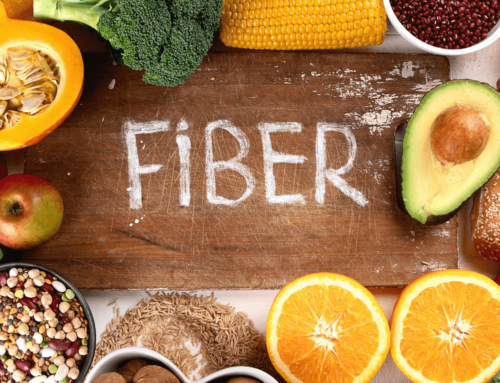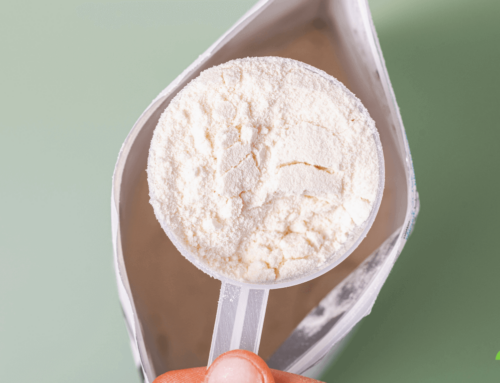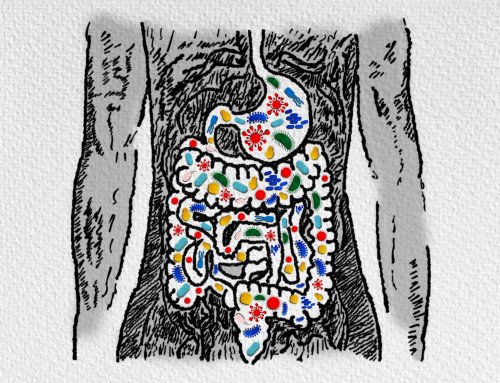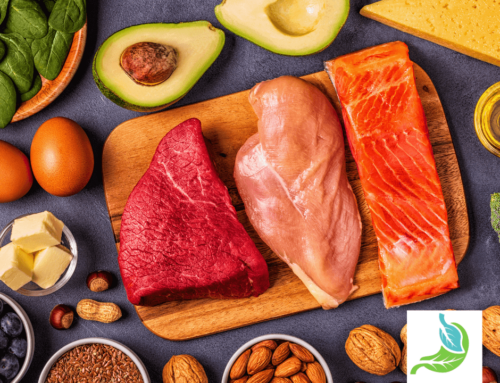This is the first post of a third part series on fiber. This post examines if fiber is good for constipation and lowering cholesterol. The second article examines if fiber is good for heart health and protecting against colon cancer. The third article examines if fiber is good for Irritable Bowel Syndrome (IBS) and heartburn.
What is Fiber?
Fiber is the indigestible part of plant-based foods that consist of structural components such as the cell walls of fruits, vegetables, nuts and legumes, the tough outer layers of grains, any other non-digestible carbohydrates as well as lignin, a substance found in plants that binds cellulose fibers together. The quick list of dietary fibers includes:
- Fructans (chains of fructose)
- Pectin
- Polydextrose
- Gums
- Stachyose
- Raffinose
- Verbascose
- Hemicellulose
- Cellulose
- Lignin
But what good is all this fiber if we can’t digest it? How is it good for us and is there any down side?
Even though we humans can’t digest fiber, bacteria (the predominant type of microbe in our guts) that live in our large intestine can, and we can utilize some of the bacterial end products for energy. We get about 25% more energy out of a meal, thanks to microbes. How is that for boosting our effective mileage? Having this symbiotic relationship with microbes provided a survival advantage throughout our evolution. This advantage, allowed our ancestors to avoid starvation when food was scarce. Sound pretty good so far?
Fast forward to modern times. Today, we find ourselves surrounded by dietary excess. We can eat pretty much whatever we want and whenever we want. The problem is that our survival instincts are like little voices telling us to eat as much as possible whenever we get a chance. In the Paleolithic part of our brains, it may be the last meal we have for days. In our Neolithic times we are overeating and overeating across all of the food groups often including fiber.
But do we really need to eat all this fiber if we are not starving?
Like most people, I grew up thinking fiber was healthy for me. Companies that market foods that contain fiber certainly publicize many reported benefits including relief of constipation, lowering cholesterol, even protecting us from heart disease and cancer. But when I looked for the scientific evidence supporting this assumption, I was surprised to find very little.
Can Fiber Help with Constipation?
High fiber foods and fiber supplements are often recommended for people suffering from chronic constipation, sometimes referred to as constipation-predominant irritable bowel syndrome or IBS-C. The goal is to use fiber to accelerate intestinal transit which seems to be slowed in these patients. But in a clinical study looking at the use of bran to reduce constipation, 20 grams of bran per day did not improve constipation symptoms compared to the placebo[i].
Along the same lines, treating 275 IBS patients with psyllium or bran fiber for three months did not improve their quality of life, though psyllium, the soluble fiber, did offer some improvement [ii]. The bran group actually suffered a high dropout rate because the participant’s symptoms including IBS symptoms and heartburn kept getting worse. A systemic review (17 studies were included) of different fiber types for treating constipation in IBS patients found that the benefits of fiber were marginal for treating constipation and in some cases, worsened IBS symptoms in general[iii]. Finally, a 2012 study showed that actually reducing or eliminating (instead of increasing) fiber was highly effective in relieving constipation [vii].
Can Fiber Lower My Cholesterol?
A small study reported that 60 grams of oat bran or oat meal per day lowered cholesterol levels by roughly 3% (that’s all!) after 12 weeks when combined with a low fat diet[iv]. However, another study found that fiber had no cholesterol-lowering effect in men with high cholesterol who did not follow a low-fat diet[v]. A third study, at Brigham and Women’s Hospital in Boston, Massachusetts, found that oat bran and low-fiber wheat had the same moderate effect on cholesterol levels, suggesting that fiber itself is not responsible[vi].
Read Part II and Part III on fiber.
[i] Badiali D, Corazziari E, Habib FI, Tomei E, Bausano G, Magrini P, Anzini F, Torsoli A. Effect of wheat bran in treatment of chronic nonorganic constipation. A double-blind controlled trial. Dig Dis Sci. 1995 Feb;40(2):349-56.
[ii] Bijkerk CJ, de Wit NJ, Muris JW, Whorwell PJ, Knottnerus JA, Hoes AW. Soluble or insoluble fibre in irritable bowel syndrome in primary care? Randomised placebo controlled trial. BMJ. 2009 Aug 27;339:b3154.
[iii] Bijkerk CJ, Muris JW, Knottnerus JA, Hoes AW, de Wit NJ. Systematic review: the role of different types of fibre in the treatment of irritable bowel syndrome. Aliment Pharmacol Ther. 2004 Feb 1;19(3):245-51.
[iv] Van Horn LV, Liu K, Parker D, Emidy L, Liao YL, Pan WH, Giumetti D, Hewitt J, Stamler J. Serum lipid response to oat product intake with a fat-modified diet. J Am Diet Assoc. 1986 Jun;86(6):759-64.
[v] Leadbetter J, Ball MJ, Mann JI. Effects of increasing quantities of oat bran in hypercholesterolemic people. Am J Clin Nutr. 1991 Nov;54(5):841-5.
[vi] Swain JF, Rouse IL, Curley CB, Sacks FM. Comparison of the effects of oat bran and low-fiber wheat on serum lipoprotein levels and blood pressure. N Engl J Med. 1990 Jan 18;322(3):147-52.
[vii] Ho KS, Tan CY, Mohd Daud MA, Seow-Choen F. Stopping or reducing dietary fiber intake reduces constipation and its associated symptoms. World J Gastroenterol. 2012 Sep 7;18(33):4593-6.







Hi Dr Robillard,
I believe I suffer from the IBS-C you mention. This has been an issue my whole life no matter what diet I have followed; low fat or low carb. I have recently cut out all wheat but have not shown any improvements in the constipation department. My mother suffered from this as does an older brother. My gastro doctor suggests Miralax, up to 3 doses a day. Do you think this is good for me?
thanks
Just used caution with any of these meds for constipation, even if they are over the counter. Take only the recommended dosage and talk to your doctor if you don’t get results in a week or so. The biggest risk with these products is becoming dependent on them. They can also cause diarrhea, dehydration and changes to your body’s natural mineral balance, particularly sodium.
You have likely become an expert on constipation given that you have been dealing with it for so long. Fast Tract Digestion has a section on constipation that discusses the issue in detail. I would be interested in your feedback on this if you have a chance to read it. Lots of green veggies, exercise, water and plenty of dietary oils and fat come to mind as helpful (years ago, fat was used as a treatment for constipation).
On the issue of Miralax, your doctor is in a better position to advise you on this, but here are a few issues from pub med, which you are likely aware of, to keep in mind. Adding too much fermentable fiber can definitely back fire and become part of the problem.
https://www.ncbi.nlm.nih.gov/pubmedhealth/PMH0000241/
Polyethylene glycol 3350 is used to treat occasional constipation. Polyethylene glycol 3350 is in a class of medications called osmotic laxatives. It works by causing water to be retained with the stool. This increases the number of bowel movements and softens the stool so it is easier to pass.
Polyethylene glycol 3350 may be habit-forming. Do not take a larger dose, take it more often, or take it for a longer period of time than your doctor tells you to.
Eat a well-balanced diet that includes fiber-rich foods, such as unprocessed bran, whole-grain bread, and fresh fruits and vegetables. Drink plenty of fluids and exercise regularly.
Polyethylene glycol 3350 may cause side effects. Tell your doctor if any of these symptoms are severe or do not go away:
nausea
bloating
cramping
gas
Some side effects can be serious. The following symptoms are uncommon, but if you experience either of them, call your doctor immediately:
diarrhea
hives
Polyethylene glycol 3350 may cause other side effects.
Hi Norm and Maureen,
I use Oxy-Powder for the times when things are not moving as they should. It seems to be completely safe and not habit forming. It has been my saviour in these times where my body just won’t cooperate. Just thought I’d share.
Lauren
I have anal fissure and GERD. The origin was constipation. I am tired . Can you recommend something.
Thanks
Hi. Ive suffered from eczema, allergies, and asthma my whole life. Ate a standard american diet as a kid and teen. Ive always had constipation when eating things like too much bread or cheese. But when I wanted to get back on track all I would have to do was eat more fiber. In june of this year I had some colonic irrigations done to see if it would improve my leaky gut symptoms. Since the very first colonic ive had servere constipation. Been diagnosed with methane sibo. Fiber actually makes things worse for me, as before all I would have to do for regularity was consume more fiber. They did not do any probiotic implanting afterwards, they just simply gave me oral probiotics which did nothing. Now im in the worst place ive ever been in my life. The colonics wrecked my life. Any suggestions would be much appreciated! Thanks